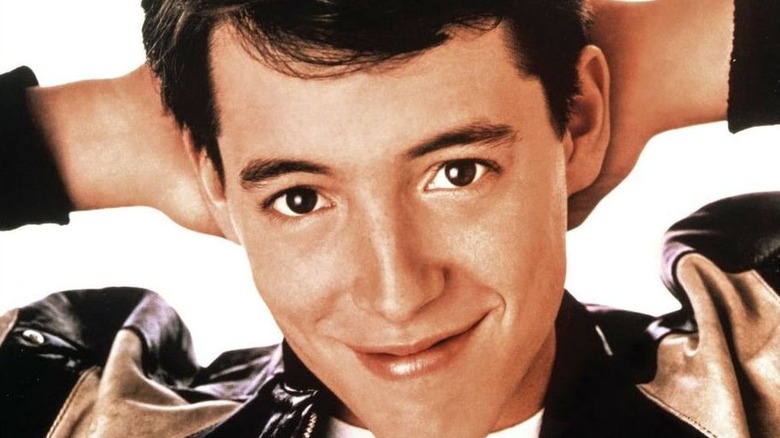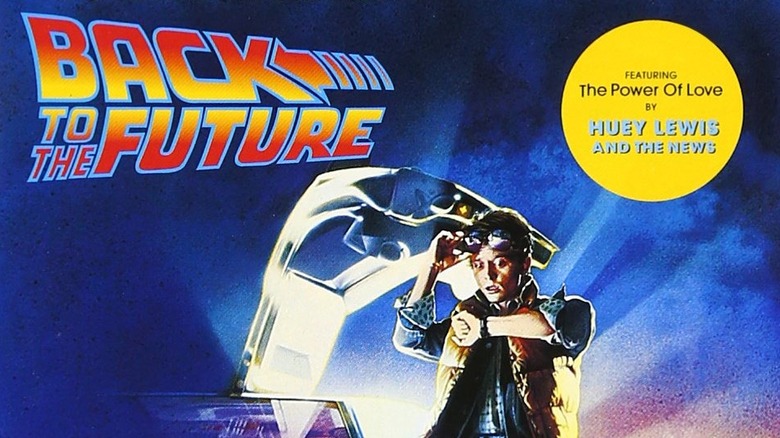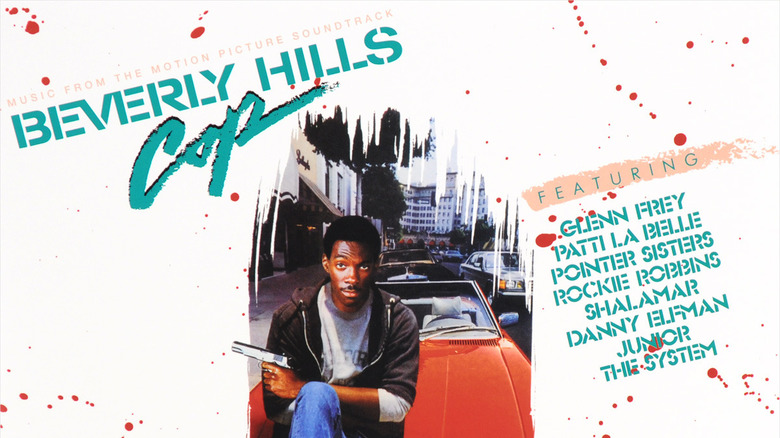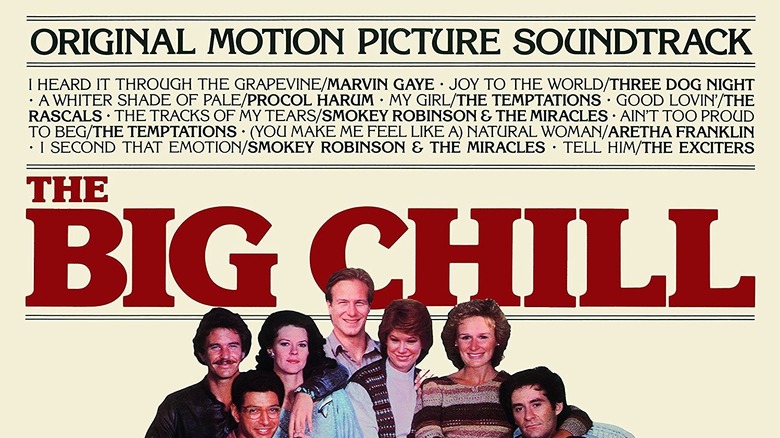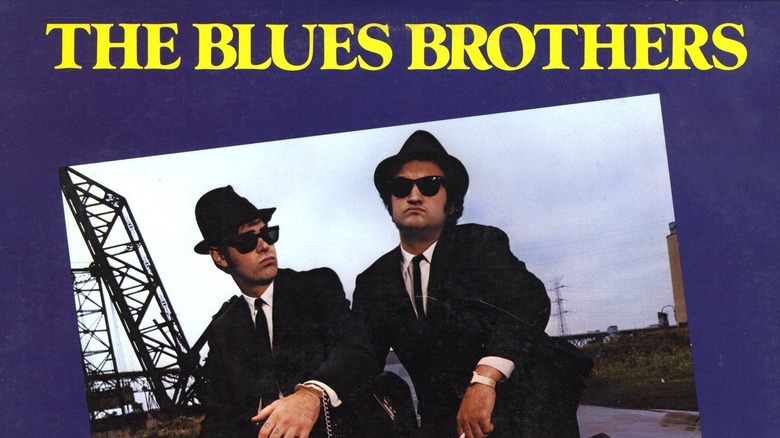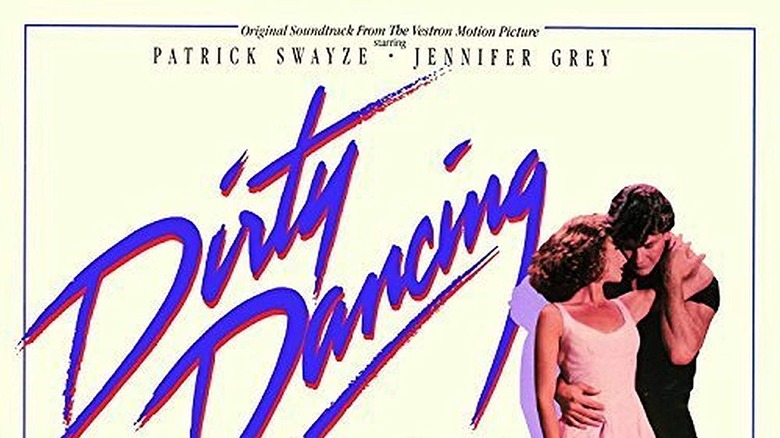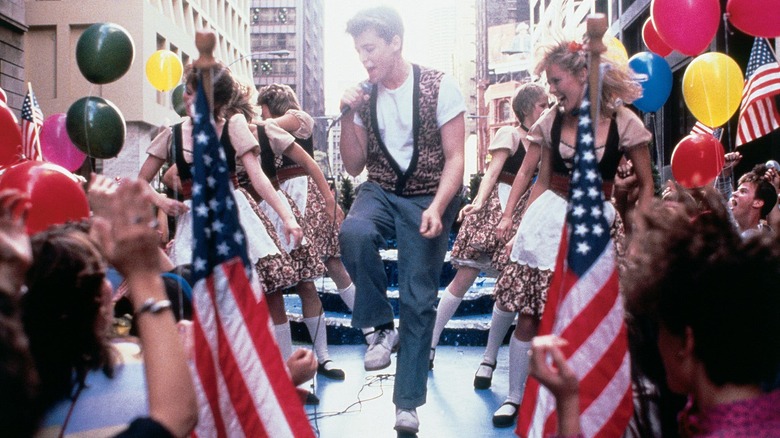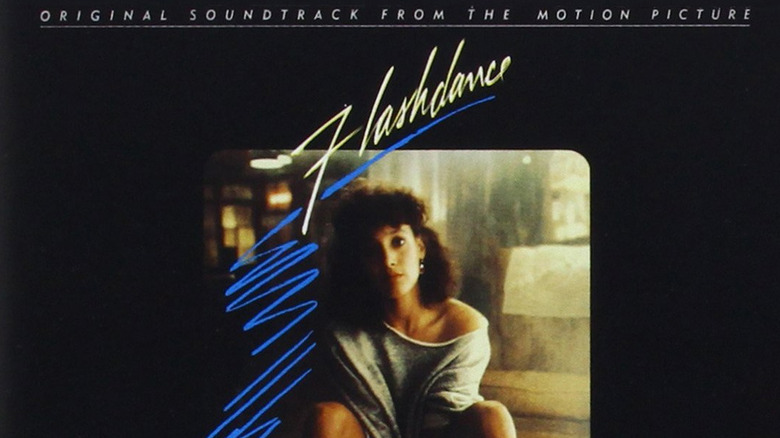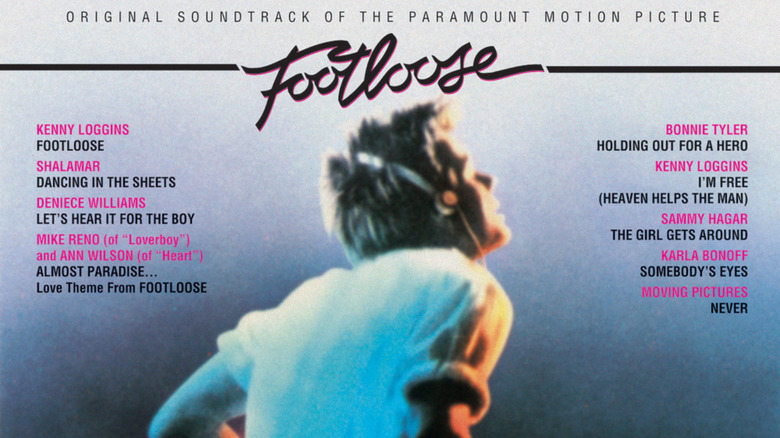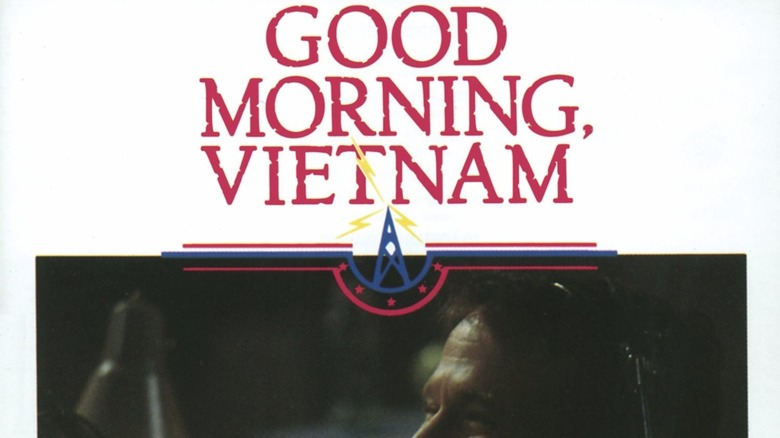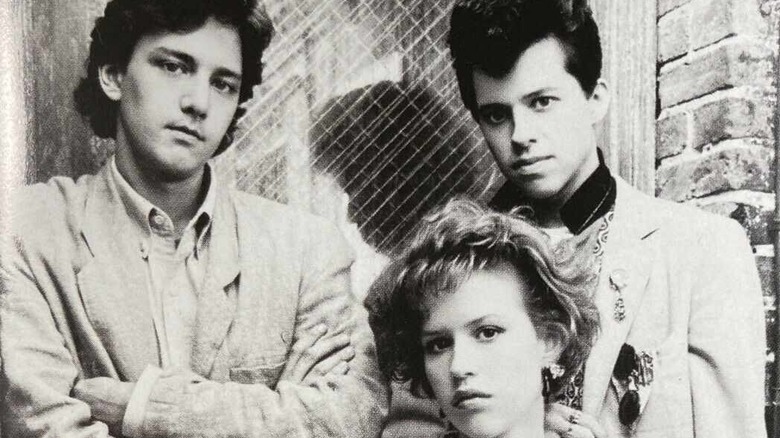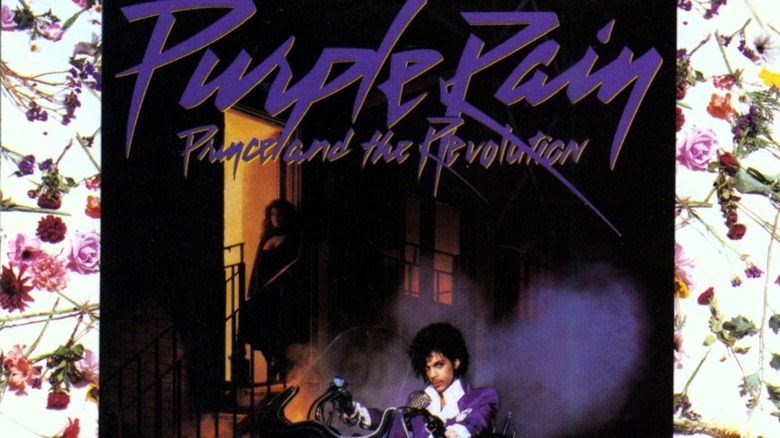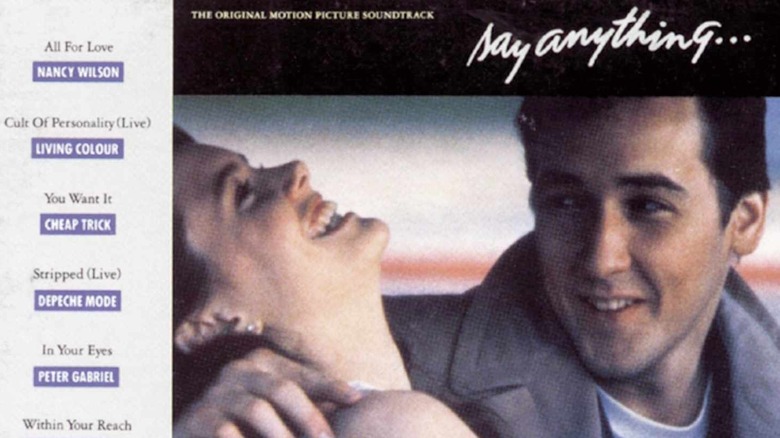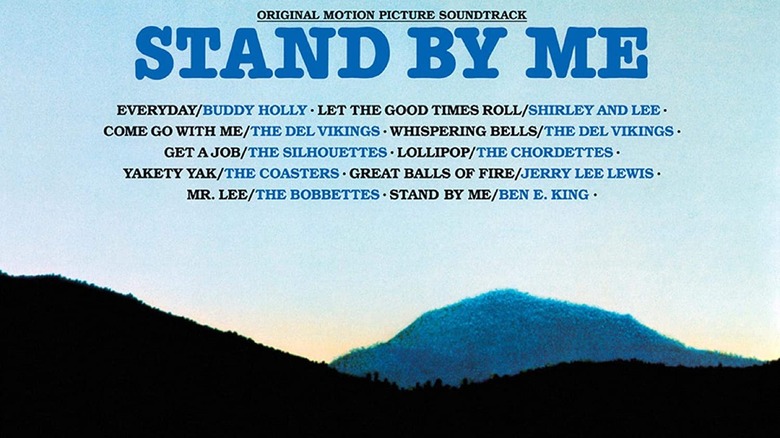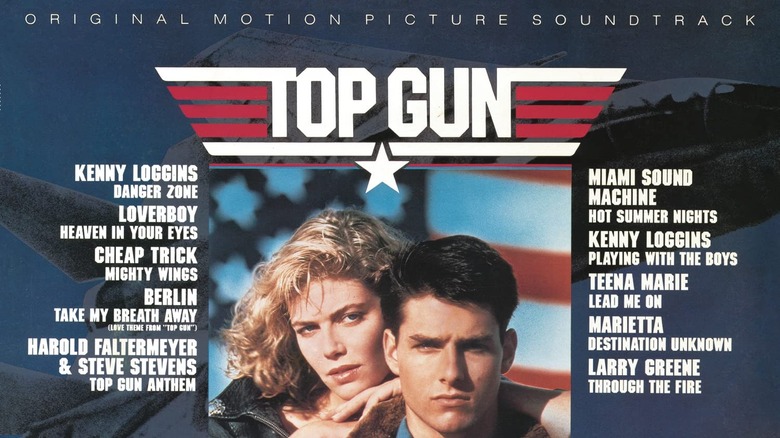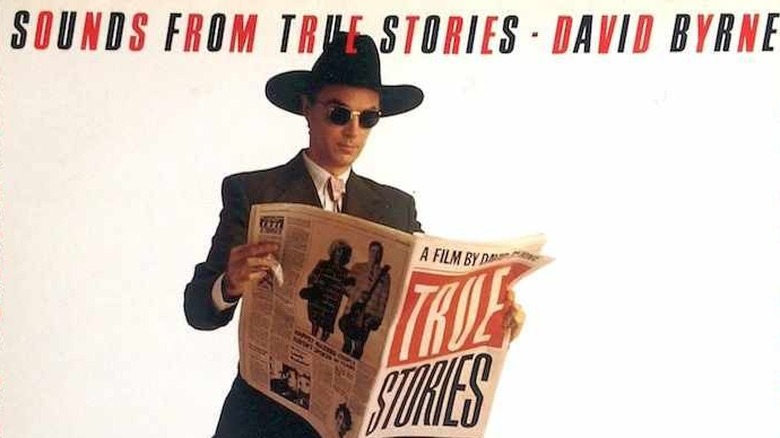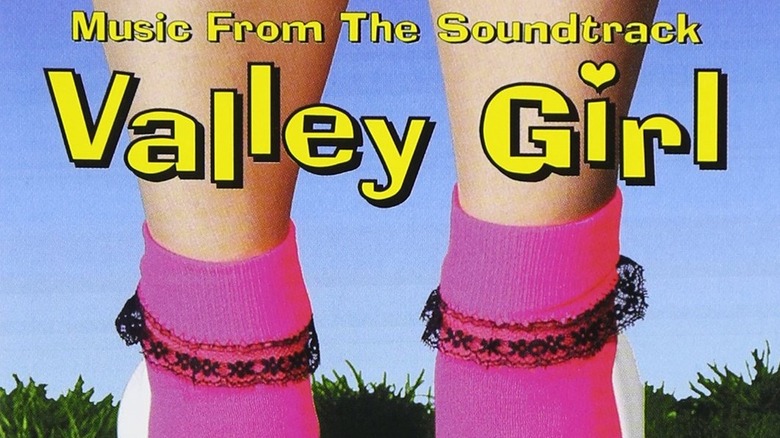The Best Movie Soundtracks Of The 1980s
The 1980s were a special decade for movies — one where big budget franchises were born, and touching teen movies were never better. The Baby Boomer generation had come of age, a new generation was claiming the future, and films balanced a sense of nostalgia with an increasingly sarcastic, often jaded worldview.
Sweet soundtracks of the 1980s were filled with modern New Wave flair and hair bands, but also had us sweating to the golden oldies of the '50s and '60s. They recalled instantly-classic scenes, introduced us to our new favorite bands, and in many cases, became the soundtrack to our own lives as well as the characters on screen. Over forty years have since passed, and these '80s soundtracks have now formed their own sort of nostalgia with fans — both for those who saw the movies back then, and for newer viewers curious about a bygone era.
With that in mind, fire up the boombox you're holding above your head and get ready for a list of the very best '80s soundtracks.
Back to the Future
Great Scott! Huey Lewis and the News "didn't fancy writing a song called 'Back to the Future'," and yet they took on the challenge from director Robert Zemeckis to come up with a rocking tune for the soundtrack. Without reading the script or even seeing the film, they came up with the epic "The Power of Love." That song scored the band their first #1 hit and earned an Oscar nomination (losing to Lionel Richie's "Say You, Say Me"). Lewis also had a cameo in the film, as the high school talent show audition judge who thinks a Marty McFly (Michael J. Fox) version of "Power of Love" is "just too darn loud."
Since the song didn't exactly fit the film's timely plot, Huey and the News also came up with "Back in Time," which was joined by other tunes from Eric Clapton and Lindsey Buckingham, and of course, some youthful rock n' roll jams from George and Lorraine's 1950s heyday. Songs like "Earth Angel" and "Johnny B. Goode" got a new lease on life, as listeners were transported to the simpler times of Hill Valley, 1955. Throw in a single track from Alan Silvestri's brilliant score, and you not only have one of the more energetic soundscapes of the '80s and '50s, but one that is truly OUTATIME.
Beverly Hills Cop
The fast paced action in this 1984 Eddie Murphy driven comedy was paired with a snappy, synth-heavy soundtrack. Big names with big '80s hair like Patti LaBelle, The Pointer Sisters, and Glenn Frey were recruited to give the film a unified sound, which proved worthy enough to win the Grammy Award for Best Score Soundtrack for Visual Media.
Frey was several years into his post-Eagles solo career by the time the "Cop" producers contacted him with "a song they felt was right for me"... "The Heat Is On." With an ultra-catchy, jazzy saxophone rhythm, it became the breakout song from the movie, and went all the way to #2 on the Billboard Charts.
For LaBelle, her two contributions, "New Attitude" and "Stir It Up," were exactly the mantras she was looking to bring to her own, new solo career and life.
Harold Faltermeyer surprisingly had an international hit with his instrumental jam named after the title character, "Axel F." He made the song as "a collage of different things because they needed the song the next morning and I couldn't make something from scratch, so I took all the tracks I had made for the entire movie and cut them together." Decades later, that song he cobbled together overnight is still a pop culture touchstone.
Danny Elfman contributed to the soundtrack as well, but three years after the release of "Cop," he said "it already feels like an out-of-date film just because of the songs." Sorry Danny, but to fans, 1984 never sounded better.
The Big Chill
Baby boomer college buddies reunite over the death of a friend and ruminate on the big picture in Lawrence Kasdan's second directorial effort, "The Big Chill," as actor Kevin Klein describes: "It's about reframing your perspective for real life after the youthful phase of your life is over."
Playing in the background and the foreground is a soundtrack that Vincent Canby noted, "is loaded with 60's music that recalls, without sentimentality, everything the friends have grown away from."
That seminal soundtrack included a ton of classic rock and R&B hits and, uncommon for films of the time, did not include any new songs written specifically for the film. All the songs were handpicked by Kasdan and his wife Meg. Meg said they had two restrictions when selecting, "We didn't want anything that made the characters too stereotypical, like psychedelic rock," adding "we didn't want the songs to fight the dialogue." The "other limit was financial," which kept us from the sight of Jeff Goldblum shaking a tail feather to The Beatles or Bob Dylan.
They could afford the Rolling Stones, whose "You Can't Always Get What You Want" so memorably opened the film — but for some reason, the Stones were absent from the soundtrack. What they ended up with instead were enough jukebox greats to fill two physical release soundtracks, with a who's who of Rock n' Roll Hall of a Famers: Marvin Gaye, The Temptations, The Young Rascals, Smokey Robinson, Three Dog Night, Aretha Franklin, and Procol Harum, just to name a few.
As "Chill" actress Meg Tilly said in 2013, anytime she hears those songs "it feels like a happy hug." She's not alone.
The Blues Brothers
John Belushi and Dan Aykroyd bonded over a shared love of Chicago and music, becoming fast friends prior to working on "Saturday Night Live" together. It was on "SNL" where they proved to excel at something else besides being making audiences laugh, becoming brothers Jake and Elwood Blues. They eventually opened for Steve Martin in concert, recorded a live album from one of those shows, and topped the Billboard charts. Naturally, a movie was the next step.
John Landis' 1980 film "The Blue Brothers" didn't skimp on the theatrics, the comedy, nor the musical components on this "mission from God." The Brothers and their excellent backing band broke out all the hits, including their crowd pleasing cover of "Everybody Needs Somebody to Love."
And they weren't alone on their mission, making pit stops and sweet music along the way with Ray Charles, Aretha Franklin, James Brown, and Cab Calloway. Truly some unforgettable artists, forever preserved on celluloid.
Dirty Dancing
Not many people believed in "Dirty Dancing," which had two "Red Dawn" actors, Patrick Swayze and Jennifer Grey, reuniting as dance partners at a Catskills resort in the summer of '63, trying heir best to prevent someone from "putting Baby in a corner."
"(I've Had) The Time of My Life" was co-written by Franke Previte, who had "no idea what the movie was about." The song was ready for its spotlight, but the film's music supervisor, Michael Lloyd, couldn't get any star to say "yes" to sing it, with the likes of Lionel Ritchie, Donna Summer, Daryl Hall, and Kim Carnes all taking a pass. Eventually, Righteous Brother Bill Medley and Jennifer Warnes signed on for the duet, and it became a mega hit, winning the film's sole Oscar for Best Original Song.
Other tracks included the Eric Carmen hit "Hungry Eyes," as well as tried and true songs by The Ronettes and Mickey & Sylvia, the ditties "Stay" and "In The Still of the Night," and even a cut by star Swayze, "She's Like The Wind."
The film wasn't just topping box office and Billboard charts, but also selling out music venues, as "Dirty Dancing — Live in Concert" toured over 100 American cities, and later the world. The concert's promoter David Fishof said it was successful "because it brought back romance, which I think was lost in the '70s and '80s."
Ferris Bueller's Day Off
There are so many magical musical moments in John Hughes' "Ferris Bueller's Day Off," and as was the norm with Hughes films, it feels like each one had its own unique musical accompaniment that immediately, inexplicably intertwined image with audio.
When Ferris eyes Cameron's dad's posh car, with fast and furious ideas running in his head, how could you hear anything but the "Doo, bow bow, chick chicka chicka" of Yello's "Oh Yeah"? When Ferris, Cameron and Sloan drive downtown, only "Beat City" by The Flowerpot Men could be playing as we're treated to a montage of Chicago's sights. When the trio takes in the masterpieces of the Art Institute of Chicago to The Dream Academy's instrumental cover version of The Smiths "Please Please Please Let Me Get What I Want," or Ferris lip syncs to "Danke Schoen," all these moments are, as our hero would say, so choice.
But here's the twist: if you remember having this soundtrack, your mind is playing tricks on you. That's right, there never was a "Ferris Bueller's Day Off" soundtrack, at least not in the '80s.
Writer/director Hughes thought "who'd want all of these songs" together and nixed the idea. However, at the time, he did self-release a two song, seven-inch record and shipped them out to those who had previously sent him fan mail.
Flash forward some 30 years later, and the fine folks at La-La Land Records finally gave Ferris his soundtrack and score their due by giving it a proper, limited edition, release.
Flashdance
The most important words on the "Flashdance" poster (that isn't "Flashdance") are "What a feeling," followed by "take your passion and make it happen." But these aren't just taglines the marketing department dreamed up, they are instead passion-fueled lyrics devised by Keith Forsey and the singer who brought them to life, Irene Cara, with backing music by the prolific Giorgio Moroder. That song, "Flashdance... What a Feeling," was the main theme of the 1983 Adrian Lyne hit film about a welder by day (Jennifer Beals) with an extracurricular passion for dancing. It also became an anthem beyond the movie, winning an Academy Award for Best Original Song.
Cara also sang the Oscar winning theme for "Fame," and she said in a 2018 interview that she was chosen because the producers "wanted a key element of 'Fame' in 'Flashdance.'" It worked, as the song spent 6 weeks at #1, and she would also pick up two Grammys herself, including Best Pop Vocal performance.
The other #1 hit from this soundtrack, "Maniac" by Michael Sembello and Dennis Matkosky, also received an Oscar nomination, and the duo won a Grammy. Strangely enough, the song was inspired by serial killer John Wayne Gacy, and originally had darker lyrics, but those were toned down when "Flashdance" music supervisor Phil Ramone approached the duo about using it for the movie (contrary to the rumors, the song was not originally written for the William Lustig film "Maniac," although the duo did watch that film for inspiration).
When the film became an unexpected hit, record stores were caught flat-footed; the label had to scramble to fill orders, and quickly rushed along music videos using scenes from the movie. Also boasting flashy, dancy work from the likes of Laura Branigan, Donna Summer, and Kim Carnes, the "Flashdance" soundtrack would spend two weeks at #1, and to date has sold over 20 million copies worldwide.
Footloose
Incredibly, 7 of the 9 tracks chosen for the "Footloose" soundtrack were released as singles, with 2 of them hitting #1 and both feted with Academy Award nominations. The album as a whole spent 9 weeks at #1 on the Billboard charts.
The Herbert Ross film about a Chicago teen (Kevin Bacon) turning a small religious town and its dance ban on its heads was a rocking good time, kicked off by Kenny Loggins' #1 hit title track playing over the credits of many a foot cutting loose. Loggins got involved in the project because his friend Dean Pitchford wrote the screenplay, "and as a favor to him, I wrote couple of songs," adding, "that turned out to be a favor for me." "Footloose" is such a big part of Loggins' life that he even turned it into a children's book in 2016.
The other #1 hit was Deniece Williams' entry, "Let's Hear It for the Boy," which played during the montage where Chris Penn's Willard was taught to dance. The Pitchford/Tom Snow composition was actually a replacement for another song that wasn't working for that scene, and was quickly written "under the gun."
Lest we forget to mention the lovely love theme from "Footloose," the Mike Reno/Ann Wilson duet "Almost Paradise," and the heart-racing "Holding Out for a Hero" sung by Bonnie Tyler. The latter, co-written by Pitchford and Meatloaf maestro Jim Steinman caused Steinman to bleed from his fingers, "pounding away with near-operatic fervor" when they first played the song for director Ross.
Good Morning, Vietnam
Robin Williams' frantic energy is still so sorely missed, but his deep catalog of films have left us with many enjoyable ways to keep his memory alive. One of his finest performances was playing real life Armed Forces Radio Service disc jockey Adrian Cronauer in Barry Levinson's seriously good 1987 comedy "Good Morning, Vietnam."
Cronauer brought a well-needed sense of humor to the men serving overseas during that war, and Williams' rapid fire intros to the records he spins set up a unique soundtrack, both on screen and for the release of the album, where comedy meets music. David Anderle, A&M's vice president of film music, said "We wanted to make it sound like you were eavesdropping on Adrian Cronauer for a day."
Interspersed between The Beach Boys, James Brown and the lead single, Louis Armstrong's "What a Wonderful World" (hitting #7 on three charts in 1988), are hilarious sound bites and impersonations uttered by Williams (Nixon, Walter Cronkite, the Munchkins from "Oz"). Some of the selections were not as well known to modern audiences, and songs like The Vogues' "Five O'Clock World" and the Castaways' "Liar, Liar" garnered new attention, and welcome royalty checks to the songwriters who spent the money on car transmissions.
The soundtrack earned Robin Williams a Grammy in 1988 for Best Comedy Recording, and became certified platinum.
Pretty in Pink
"Sixteen Candles" star Molly Ringwald got her director John Hughes hooked on the Psychedelic Furs' song "Pretty In Pink," and when Hughes found himself stuck with that title in his head and inspired by her "predisposition toward pink," he wrote a screenplay that became the classic 1986 Howard Deutch film.
Rounded out with tracks by the likes of New Order, INXS, Suzanne Vega and The Smiths, it had "a specific feel and rhythmic energy — cool, tough and electronically snappy," praised The New York Times.
One of the key songs was "If You Leave" by Orchestral Manoeuvres in the Dark, and it was miraculously written in a day. The band, handpicked by Hughes himself, wrote a different song for the big prom scene finale, but the original ending where Andie ends up with Duckie didn't play well with preview audiences, and so the scene and tune all had to be scrapped and rethought.
If you're wondering what Psychedelic Furs lead singer Richard Butler thinks about all this, he isn't a fan.
"[It isn't] my kind of film. It gave us a lot of exposure but was a mixed blessing. We had to rerecord the song for the film, and it was a bigger hit the second time, but the original is better. The film had nothing to do with the lyric and in a way it made it trite. It wasn't about somebody actually wearing pink," he explained during a 2020 interview. "For me, Pretty in Pink means someone naked. It's about a girl who sleeps around a lot and feels like she benefits from it, whereas in reality people are talking and laughing about her behind her back ... The sarcasm, sorrow and general malaise and melancholy are autobiographical."
Purple Rain
Prince was riding high on the success of his album "1999," and looking to go even bigger on his next endeavor — which ended up being the film "Purple Rain," with the masterful accompanying soundtrack album. Co-screenwriter William Blinn said, "It wasn't his life, but it was about his life," adding "he knew where he'd come from, and he wanted the movie to reflect that."
The first two singles released were "When Doves Cry" and "Let's Go Crazy," and both went to #1; the "Purple Rain" song peaked at #2, after being originally given to "Stevie Nicks, but she felt intimidated by it," said Revolution keyboardist Lisa Coleman. All three tunes helped keep the soundtrack album at #1 on the charts for 24 weeks. With additional performances by Morris Day and The Time and Apollonia 6, the film was the 12th highest-grossing movie of 1984, and netted the Purple one an Academy Award for Best Original Song Score.
Not everyone was pleased with Prince's sexy music, however. Then-Senator Al Gore's wife Tipper became interested in crusading against supposedly-lewd albums when her 11-year-old daughter bought the "Purple Rain" soundtrack and played "Darling Nikki," a song with references to masturbation. This would lead to Senate hearings, and eventually the creation of the "Parental Advisory" warning label.
"Purple Rain" is still beloved to this day, as fans poured back into theaters to see the film and buy Prince's albums after his untimely death in 2016. ?uestlove of The Roots has gone so far to say that "'Purple Rain' really started hip-hop culture, whether the historians want to view it that way or not." To date, the soundtrack has sold more than 25 million copies worldwide.
Say Anything...
Cameron Crowe wrote "Fast Times at Ridgemont High" and also had a hand in piecing together its soundtrack, as he "really, really loved how music could enhance a scene." When it came to his directorial debut, 1989's improbable love story between Lloyd Dobler (John Cusack) and Diane Court (Donovan's daughter Ione Skye), the former Rolling Stone writer once again took great care in selecting music to enhance scenes.
The soundtrack is littered with great tracks by Red Hot Chili Peppers, Depeche Mode, Living Colour and even Crowe's then wife, Nancy Wilson. Cusack not only contributed to the soundtrack via the "Lloyd Dobler Rap," but also gave suggestions, as he said, "Cameron wasn't hip on The Replacements."
Of course, one of the most defining movie music moments of the '80s occurred when Dobbler attempts to win back Diane's heart by blaring Peter Gabriel's "In Your Eyes" with his boombox lifted above his head, outside her window at dawn. "To Be A Lover" by Billy Idol was originally considered, but Crowe felt that it and several other considered songs simply didn't work. While listening to his own wedding mix tape, the Peter Gabriel classic came on, and it just clicked. Gabriel initially turned Crowe down, confusing his movie with another requesting the song (the John Belushi biopic "Wired"), but with some nudging from Rosanna Arquette, who the song is reportedly about, the rest is history. Crowe admitted that the scene "just wouldn't have been the same without 'In Your Eyes.'"
In 2012, at a Peter Gabriel concert at the Hollywood Bowl, Cusack handed Gabriel a boombox, who held it high above his head before breaking into "In Your Eyes." Crowe, who was also at the show, called the moment "surreal and beautiful."
Stand By Me
After a screening of "Stand By Me", Rob Reiner's take on Stephen King's 1982 novella "The Body," King, according to the director, said, "That's the best film ever made out of anything I've written, which isn't saying much. But you've really captured my story. It is autobiographical." The coming of age tale starring Wil Wheaton, River Phoenix, Corey Feldman, Jerry O'Connell, John Cusack and Kiefer Sutherland took its title from a different King, Ben E. King's 1961 song, which was chosen at the last minute as the "least disliked" option left on the table.
Reiner holds "Stand By Me" near and dear to his heart, saying, "It was the first time I did a film that reflected my own personal sensibility; it had a mixture of melancholy, humor and nostalgia. I was 12 in 1959 so the music was the music I listened to and the feelings I had in relation to my father, I injected into the film." That music made for a gem-packed soundtrack including songs like "Everyday" by Buddy Holly, "Come Go with Me" by The Del-Vikings, "Get A Job" by The Silhouettes, and of course, "Lollipop" by The Chordettes.
The title track also resurrected Ben E. King's career. "What's interesting to me is that a song I wrote as a love song is being adopted by kids everywhere as a song about friendship," he marveled at the time of the film's release. "I think that's interesting: two generations listening to the same song are getting different, but equally positive, meanings from it."
Top Gun
Tony Scott's "Top Gun" soared to the top of the box office in 1986, while its high flying, #1 charting hit soundtrack saw six of its tracks released as singles, including the Grammy Award winning "Anthem" by Harold Faltermeyer.
Some of the most memorable songs of the Tom Cruise picture were composed and written by Giorgio Moroder and Tom Whitlock. One of them was "Danger Zone," which was turned down by Bryan Adams, Corey Hart, and REO Speedwagon. Toto was lined up to record it, but it didn't pan out, so Kenny Loggins, who "just happened to be in the studio and they needed a singer right away" got the gig and it turned into one of the biggest songs of his career.
The other Moroder/Whitlock collaboration that took people's breath away was ... "Take My Breath Away," which was performed by Berlin. There was some apprehension within the band about doing a song that wasn't their own, and also "wasn't our sound," but the song became an international hit and went on to win the Academy Award for Best Original Song. Decades later, that song is still taking breaths away.
True Stories
Might we interest you in a soundtrack that gave the band Radiohead its name? The Talking Heads track "Radio Head" and the tale behind it ("Groundhog Day" star Stephen Tobolowsky could apparently read people's tones), and the others told and sung in frontman David Byrne's 1986 directorial debut "True Stories," were, well, "true stories" found in tabloids.
Byrne played a visitor to the fictional Texas town of Virgil as they prepared for their "Celebration of Specialness." He treats the audience to a musically visual poem of consumerism, architecture, emptiness, oddities and interesting folk in every inch of the film. Joining in on the lyrical fun are a pre-"Roseanne" John Goodman, Annie McEnroe, Pops Staples, John Ingle and the St. Thomas Aquinas Elementary School Choir, although their vibrant performances of the songs sadly did not get an album release at the time.
"True Stories" was the sort of film that could only come from the mind of Byrne, so it seems only appropriate that it would be accompanied by his offbeat take on a "soundtrack."
Rather than releasing the music from the film, Talking Heads recorded 9 of the film's songs, which resulted in their seventh studio album, named after the film. Their hilariously fun industry mocking music video for "Wild Wild Life," which was lifted directly from a scene in the movie, won a Video Music Award in 1987 for "Best Group Video." That same year, instrumentals from the film by Byrne, Meredith Monk, Kronos Quartet, and others were released separately as "Sounds from 'True Stories'."
Good things come to those who wait, as a definitive soundtrack of the film, including the original cast' recordings of the songs, was released in 2018 as "True Stories, A Film By David Byrne: The Complete Soundtrack."
Valley Girl
Frank Zappa's only Top 40 hit featured his daughter Moon belting out "Valspeak" (San Fernando Valley lingo) like "Gag me with a spoon!" in their 1982 satirical ditty "Valley Girl." Zappa was none too pleased when his title and spirit were lifted by director Martha Coolidge and turned into a movie just a year later.
The resulting Valley-spoken take on "Romeo and Juliet" starred Deborah Foreman and a practically-unknown Nicolas Cage, and was infused with New Wave and Punk music to match its authentic aesthetic. Coolidge was well-versed in the music scene at the time, and "selected each song along with my great music supervisor, Michael Papale," like the Psychedelic Furs' "Love My Way," and Modern English's "I Melt With You." Josie Cotton's "Johnny, Are You Queer?" was both a standout track and a controversial one, and she was impressed that Coolidge was "brave enough to put that song in the movie." Coolidge also put Cotton in the movie, performing at the homecoming dance.
A "Valley Girl" soundtrack record was planned for release, but due to song swapping in post production by CBS (Men at Work in place of Clash, etc), it was, according to Coolidge, "pulled" at the last minute. She added that "the studio put out a little record of their own, but it took years for Rhino Records to put together the real soundtrack album!"
